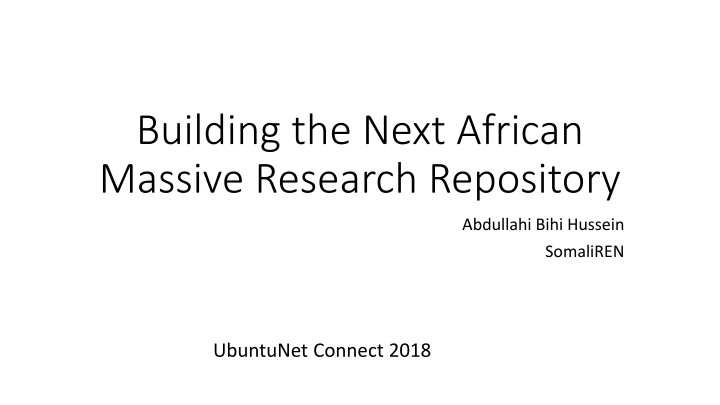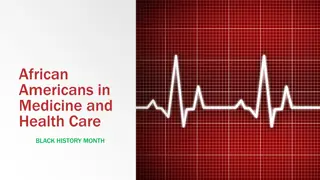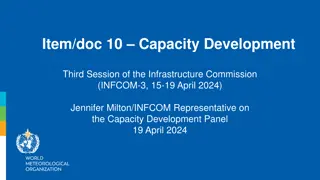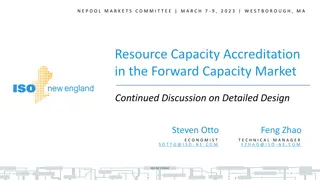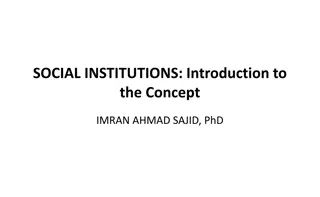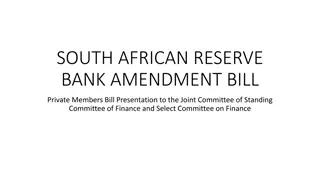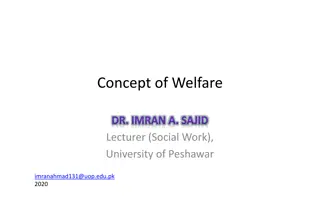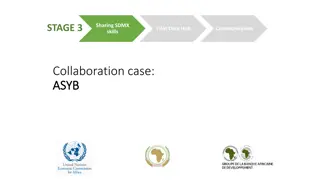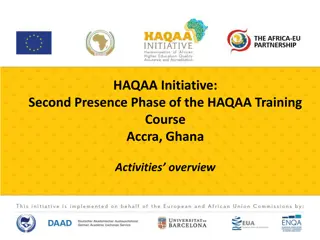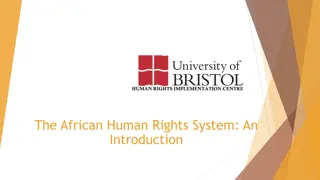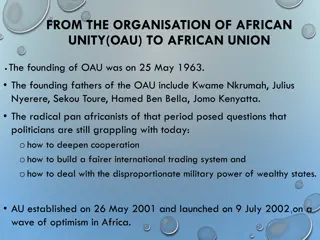Enhancing Research Capacity in African Institutions
In a landscape where research output is limited and access to repositories is costly, efforts are underway to uplift African research institutions. Initiatives like digital repositories, research grant programs, and skills training mark a resurgence in research culture. The Somali Research and Education Network (SomaliREN) is playing a pivotal role in facilitating these advancements, advocating for improved visibility and fostering collaboration. A pilot project by the UbuntuNet Alliance aims to establish digital research repositories for member institutions, with a focus on federation and value-added tools.
Download Presentation

Please find below an Image/Link to download the presentation.
The content on the website is provided AS IS for your information and personal use only. It may not be sold, licensed, or shared on other websites without obtaining consent from the author.If you encounter any issues during the download, it is possible that the publisher has removed the file from their server.
You are allowed to download the files provided on this website for personal or commercial use, subject to the condition that they are used lawfully. All files are the property of their respective owners.
The content on the website is provided AS IS for your information and personal use only. It may not be sold, licensed, or shared on other websites without obtaining consent from the author.
E N D
Presentation Transcript
Building the Next African Massive Research Repository Abdullahi Bihi Hussein SomaliREN UbuntuNet Connect 2018
Our Context Limited research output from our universities An even more limited budget for research development Very expensive subscription to access pay-walled research repositories Plagiarism is rampant in our member institutions I was asked to pay for access to my own paper
The State of Our Research Africa produces 1.1% of the world s research output A significant percentage of the world s research output is on Africa Access to research databases and repositories is too expensive for the African research and education institutions
The Case of Somali R & E institutions Research output at our member institutions is picking up A trend of research and collaboration a new era of research resurrection HE Leadership commitment to create and support a research culture in their member institutions Some of the universities started research grant programs for their faculty as of January 2018 Increased interest to deploy digital repositories SomaliREN plays the role of the facilitator Advocating for improved research Providing the necessary tools to improve research publication and visibility Training on research skills, data analysis and visualization and the administration of digital repositories
Research Repository Services pilot project With the help of UbuntuNet Alliance digital repositories has have been deployed for 5 member institutions Work on 5 more is ongoing Training on Dspace administration organized (used materials provided by JISC) The formation of the Librarians and Knowledge Managers Community Goals: Establishment of a digital research repository for each of our member institutions Federation of the digital repositories under an NREN-level repository via harvesting Building tools that add value to the repositories analytics and metrics, plagiarism checker
Acknowledging the Existing Efforts Several regional bodies have implemented regional repositories AAU s DATAD-R, AJOL and others Even free access to existing commercial databases is available (R4L) A hierarchical approach to building a massive African research repository would be: More efficient in terms of growth It is a bottom-up approach which means an improved sense of ownership Reflects the Ubuntu spirit where each one contributes to the dish in their own capacity for the good of all Builds on the proven successful model of R&E connectivity
The problem with our research output reminds us of the state of our Internet traffic a few years ago: It was expensive It had to go to Europe and North America before it came back to its origin It was addressed (to some degree) through consistent efforts by African IXP operators Or may be it should remind us of the state of our coffee Beans sent to Europe, processed and put in shiny packages only to be resold to the people who farmed the beans
Building the NAMRR Building on the successful concepts out there (MOOCs, Open Access, Connectivity at the NREN and RREN levels, identity Federation, etc.) A very simple concept with a far- reaching impact Using the repository harvesting APIs and other related technologies to build a Federated Research Repositories based on the hierarchical REN model Tools (Analytics and metrics, Plagiarism) Continent Level NAMRR UA WACREN Repository RREN Level Repository KENET Repository SomaliREN Repository ngREN Repository NREN Level SIMAD University Repository Benadir University Repository Mogadishu University Repository University Repository Member Level
Roles to Play Regional REN Technical support in setting up repository infrastructure (including cloud hosting, etc) where needed to other NRENs Sensitizing regional collaboration Supporting more community activities to generate and showcase more research work Aggregation and harvesting at the regional level Federated Regional Repositories National REN Technical support, hosting and maintenance where needed More community activities: formation and support of communities of practice by providing the necessary e-infrastructures Aggregation at the national level - Federated National Repositories Member institutions Collaboration with other institutions to stimulate the generation of more research work Promoting the publication of both student and faculty research work in the repositories Putting in place pro-research academic policies, incentive programs, etc.
